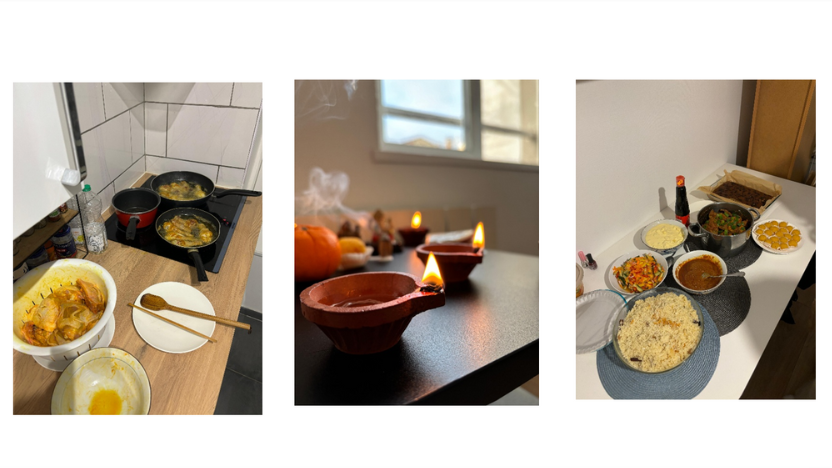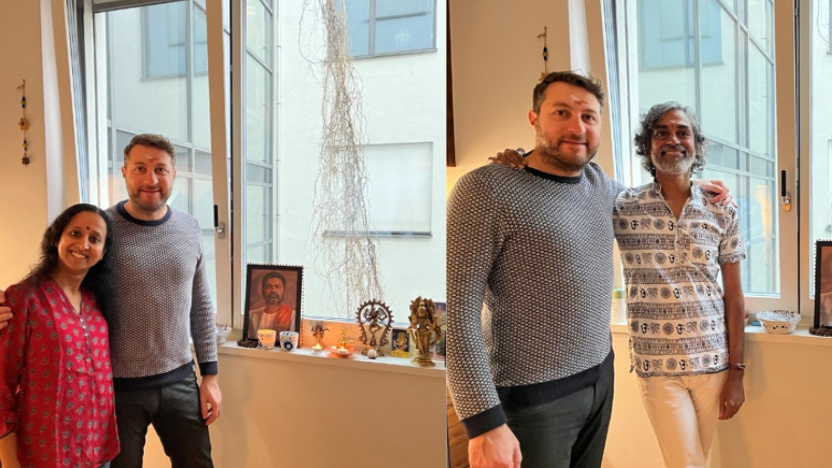Celebrating Deepavali away from home can be bittersweet. As it denotes, for those living abroad in countries, their celebration often feels quieter and more distant. Without public holidays, bazaars, firecrackers, etc - Deepavali might show a different kind of feeling being away from home.
With that being said, Astro Ulagam had the chance to interview some wonderful people celebrating abroad, and their stories are sure to warm your heart!
Nantanaa Mutharasu | Canada
Occupation: UX Designer | Origin: Kuala Lumpur, Malaysia | Years away: 10
In Vancouver, where Deepavali is not a public holiday, Nantanaa Mutharasu has spent the last ten years celebrating the festival in her own way. The weather is cold, and the day often feels like any other. To keep her connection, she calls her parents every day in the week up to Deepavali. She listens to her mother talk about making palagarams and feels the distance even more. She misses helping in the kitchen and eating the snacks together.
Two years ago, she visited Kuala Lumpur with her one-year-old daughter. She celebrated with her entire family members. Together, they prayed, changed into new clothes, lit sparklers, and shared food and palagarams. That memory made her miss home even more when she returned to Canada.
Today, she keeps the celebration simple. She usually says a short prayer and prepare food at home. She once tried to make murukku from scratch because premade flour was not available. She remembers saying, “it was too much.” Her family no longer buys new clothes every year. Instead, they wear their current traditional clothes and spend time making video calls to their loved ones.
Some of the old customs have changed. When she was younger, the family poured castor oil into their ears before the festival. Now, she only puts a little oil on her head and uses shikakai powder during her bath. She no longer does long prayers.

Nantanaa rarely decorates for Deepavali, but she wants to do more for her daughter so she can grow up with good memories of the festival. This year, they plan to travel, and she looks forward to letting her daughter hold sparklers for the first time.
Technology helps her stay close to her family. “Thanks to technology, I video call my family, that’s the only way I get to stay connected with them,” she says. “Sharing pictures with each other and commenting on how beautiful they look is my favourite part! I love seeing all my siblings over a video call, it really makes my day.”
A week before the festival, she visited a Malaysian friend in Toronto. The friend had just made murukku and achi muruku. Together with another Malaysian, Nantanaa tried making kuih dahlia for the first time. They followed a Malay YouTube tutorial and spoke in Malay as they worked. She calls it “a core memory” with her daughter. She believes that even though celebrations abroad look different, the heart of the festival remains the same. “It will look very different,” she says, “but I realised it’s the people who make the difference. Even one person can make all the difference, let that be you.”
Krishnapriya Krishnan Santhadevi - Germany
Occupation: AI Engineer | Origin: India | Current: Wurzburg,Germany | Years away: 3
The streets in Germany stay peaceful on Deepavali morning, but Krishnapriya Krishnan Santhadevi remembers the bright lights and loud fireworks in India. Back home, everything changes during the festival. The streets are full of lights, the air smells of sweets, and everyone wears colourful new clothes. Families clean their homes, visit temples, and receive blessings from their elders.
In Germany, the day is a regular workday, but she still follows her main traditions. She wakes up early, takes an oil bath, wears traditional clothes, and lights diyas in her room or on the balcony. She makes simple sweets such as laddoo or gulab jamun for pooja. She listens to devotional songs and matches her prayer time with her family’s prayers. In the evening, she cooks with friends and watches a movie.
Some traditions are harder to follow. Firecrackers are not allowed, and outdoor diya lighting is limited. Ingredients can be expensive or hard to find, so she prepares fewer dishes. She decorates with fairy lights and rangoli stickers. When possible, she travels to other cities to join community events.
Video calls keep her connected to her family. “Video calls are my lifeline during festivals!” she says. She joins their pooja virtually, shares decoration photos, and sometimes eats together with them on video. “Me with my store-bought sweets, and them with their homemade ones,” she says with a smile.

Since 2023, she has celebrated with friends in Germany. They cook a mix of North and South Indian dishes, play Bollywood music, and teach German classmates to light diyas safely. These small moments make the festival feel special again.
Her message to others celebrating away from home is “Don’t let distance dim your festive spirit, create your own version of Deepavali. It’s not about how grand the celebration is, it’s about how you bring positivity into your surroundings. Deepavali is, after all, a celebration of light over darkness and that light can shine anywhere.”
Varshini Prathaban - France
Occupation: Student | Origin: Malaysia | Current: Lille, France | Years away: 1.5
In a small French city with few Indians, Deepavali feels different for Varshini. She grew up knowing it as a time of togetherness like cleaning the house, praying as a family, cooking food, and sharing laughter. Living abroad means she must create her own way to celebrate.
She admits, “This year I feel a bit stressed. I really want to celebrate and not give up on it, to make
every year a little better than the last.” She cleans her house, performs prayers, and wears new clothes. At night, she cooks and hosts a small open house for around twenty friends. Because there is no temple in her city, she cannot continue that part of the tradition.

Varshini stays connected with her family by updating them on her preparations. She matches her decorations with theirs so the celebration feels shared. On the day itself, she makes video calls to join in virtually. For her, the meaning of Deepavali lies not in the size of the gathering but in the effort to keep the festival alive.
Unlike some of her peers, Varshini hasn’t created entirely new ways to celebrate in abroad. She focuses on preserving what she already loves. This for her, what keeps the meaning of the festival strong. Living away has also made her more aware of how much she values her culture. “I’ve always appreciated my culture,” she says softly. “But being here has actually made me feel even more grateful for my community and for the accessibility I have back home to practice my traditions.”
Karthik Kalyanam - Switzerland
Occupation: Self-employed | Origin: Visakhapatnam, Andhra Pradesh, India | Years away: 15+
Karthik Kalyanam has lived in Zurich for more than fifteen years, but his memories of Deepavali in India remain strong. “Celebrating in India and elsewhere cannot be compared,” he says. “In India, everyone is involved in the celebrations, almost despite religion. Outside India, it is mostly among Indian and Asian communities.”
For a long time, his celebrations were quiet. He and his wife shared a simple prayer, lit lamps, and enjoyed sweets together. Recently, they have started to celebrate again in their own way. They no longer use fireworks because it requires special permission. Instead, they invite friends over, share food, and talk about the meaning of light over darkness.

Living abroad has shaped his view of culture. Karthik believes their traditions are “unique, but not uniquely unique.” To him, Deepavali is personal. “Celebrate or not in your own way,” he says. “Living in your own light is the true meaning of Deepavali.”
Selva Ramasami - New Zealand
Occupation: Retired (Ex–Ministry of Justice New Zealand ) | Origin: Slim River, Malaysia | Current: Wellington, New Zealand | Years away: 23
When Selva Ramasami migrated to New Zealand in 2002 with his wife and three children, Deepavali was quiet and lonely. There were few friends, and the absence of extended family made the celebrations feel small. Over the years, the Malaysian community grew, and the festival became spirited.
Because Deepavali is not a public holiday in New Zealand, weekdays are quiet. But in weekends bring community gatherings with cultural programmes, dance, music, and food. They celebrate together with people from Fiji, India, South Africa, and Mauritius. Each group brings their own traditions, creating a warm and multicultural celebration.
Every year, the New Zealand government hosts a Deepavali Celebration at the Parliament. The Prime Minister and other ministers join the community to celebrate the festival, making it a meaningful and recognised occasion at the national level.

Selva’s family still follows Malaysian customs. They prepare murukku and other sweet and savoury snacks, wear new clothes, give ang pau to children, and take oil baths when they can. Firecrackers are not allowed at home, but sometimes the city council organises fireworks.
Every year, Selva welcomes new Malaysian families and students. “That makes them feel emotional and happy just looking at the food and all the sweets and the conversation,” he says. “It creates the mood of celebration of Deepavali.”
Schools in New Zealand have also started to recognise the festival. Children wear Indian outfits, perform dances, and learn about Deepavali together. Sometimes Selva celebrates in Melbourne with his children. “Always reach out to people and get connected,” he says. “That will help you make Deepavali an occasion where you don’t feel lonely.”







